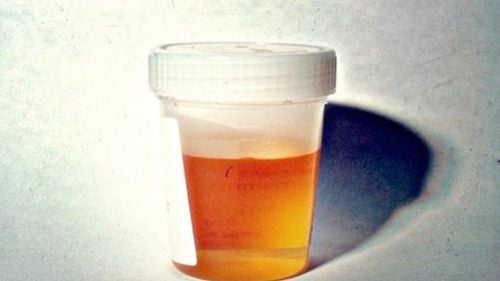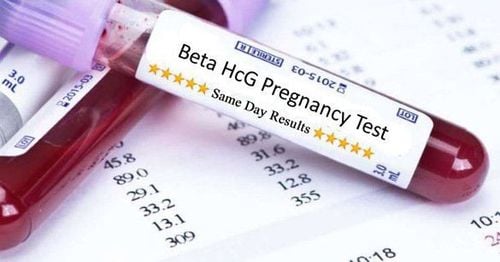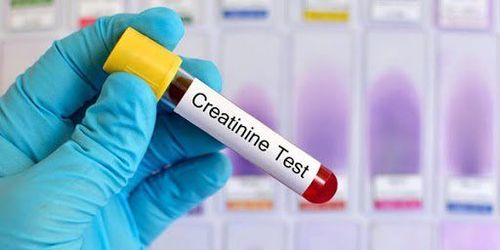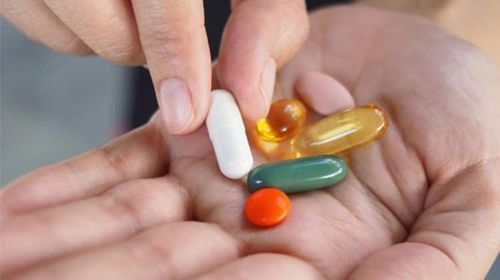This is an automatically translated article.
The article was consulted professionally with Master, Doctor Do Thi Hoang Ha - Doctor of Biochemistry - Laboratory of Laboratory - Vinmec Hai Phong International General Hospital.Blood creatinine test is a very commonly performed test, along with the urine creatinine test has an important meaning, helping to evaluate and monitor kidney function.
1. What is a creatinine test?
Creatine in the body is synthesized in the liver from arginine and methionine (for endogenous creatinine). A large portion of creatinine is maintained stably in striated muscles, which play an important role in muscle energy production. Creatinine is a breakdown product of creatine in the body's muscles, transported by the blood to the kidneys, where the kidneys will filter and eliminate creatinine in the urine. About 2% of the body's creatine is converted to creatinine each day in the muscles by the enzyme Creatin - phospho Kinase (CPK). The body's muscle mass is usually preserved, so the amount of creatinine produced is almost unchanged.The kidneys are the only way to eliminate creatinine because in the kidneys, creatinine is filtered through the glomeruli and not reabsorbed by the renal tubules, so blood and urine creatinine tests help assess kidney function accurately.
The amount of creatinine in the blood is normal when the excretory function of the kidneys is normal. The amount of creatinine in the blood increases abnormally when the ability to remove creatinine from the body decreases, this is a sign of kidney failure or kidney dysfunction.
2. What is the normal blood creatinine test result?
Blood creatinine is assessed as normal when within the following limits (depending on the laboratory as well as the chemicals, equipment, the reference range of the test may vary slightly):Female : 0.5-1.1 mg/dl or 44-97 μmol/l Men: 0.6-1.2 mg/dl or 53-106 μmol/l Adolescents: 0.5-1.0 mg/dl or 44-88.4 μmol/l Children : 0.3-0.7 mg/dl or 26.52-61.88 μmol/l Newborn: 0.3-1.2 mg/dl or 26.52-106.08 μmol/l When blood creatinine is higher than the normal range, the patient is at risk of depression kidney . The higher the blood creatinine, the more severe the patient's kidney failure.
3. What cases need to test creatinine in the blood?
A blood creatinine test is usually done as a routine test as part of basic biochemical tests. This test is especially necessary when the patient has chronic conditions such as kidney failure, diabetes, high blood pressure, or when the patient is taking medications that can affect kidney function. Whether to perform a blood creatinine test regularly or not will depend on the patient's medical condition and risk of kidney damage.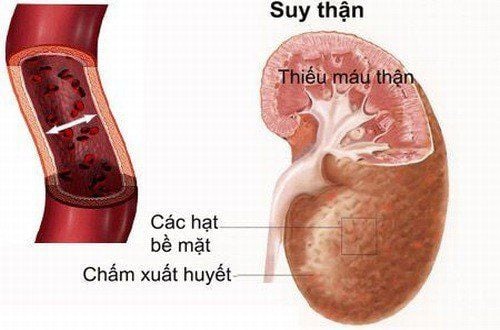
4. Creatinine in the blood increased in what cases?
Blood creatinine is increased when the patient has renal failure due to any cause:Renal failure due to pre-renal causes such as dehydration reducing circulating volume, blood loss, septic shock, cardiogenic shock,, narrowing of the arteries Renal failure due to renal causes: high blood pressure, diabetes, systemic lupus erythematosus, glomerulonephritis leading to glomerulonephritis, renal vasculitis, interstitial nephritis, hypertension pressure, renal tubular necrosis, nephrotoxicity, diseases such as increased uric acid, multiple myeloma, hypercalcemia causing damage to the renal tubules Renal failure due to the following renal causes: urinary stones, urethral obstruction, Bladder neck obstruction (due to prostate enlargement, prostate cancer, ...) Blood creatinine can also increase after a large meal with too much meat or the patient is taking some drugs that increase creatinine. in the blood such as Amphotericin B, Captopril, Ascorbic Acid, Trimethoprim, Cephalosporin, Testosterone, Coricoid, Mannitol,... In addition, when the patient has hypothyroidism, the thyroid function may decrease. may affect the excretory function of the kidneys, increasing the concentration of creatinine in the blood.
5. In what cases is blood creatinine decreased?
Blood creatinine may decrease in cases such as:Patients with severe malnutrition or some diseases that cause muscle atrophy, muscle mass will decrease over time, so blood creatinine will be lower than standard. Patients using a number of drugs that reduce creatinine levels in the blood such as: Cimetidine, Cefoxitin, thiazide diuretics, Vancomycin, Chlopromazine, marijuana,... Blood is diluted Pregnant women
6. Symptoms of the body when the amount of creatinine in the blood increases
High blood creatinine is usually due to impaired kidney function. The symptoms of impaired kidney function are varied. Some people have no symptoms, while others have symptoms such as fatigue and weakness, shortness of breath, swelling of the feet and ankles, nausea, vomiting, change in the amount of urine, muscle twitching corns and cramps, persistent itching, hiccups, ...Some warning signs of impaired kidney function include:
● Fatigue, lack of concentration, insomnia, loss of appetite;
● Swelling, edema in the face, abdomen, thighs, ankles;
Foamy, bloody or coffee-colored urine;
● Decreased urine output;
● Burning sensation when urinating, abnormal discharge while urinating, change in urination habits, nocturia;
● Pain in the hip and back, below the rib cage, near the kidney position;
Increased blood pressure;

7. Things to keep in mind when testing blood creatinine
The blood creatinine test is done on serum or plasma, usually in the morning. The amount of blood taken is about 2ml, the patient does not need to fast before taking blood for testing. The time to perform the test is usually 1 hour.Factors that can affect test results such as broken red blood cells, after a meal containing a large amount of protein can increase the test value. According to circadian rhythms, creatinine levels are highest in the late afternoon and lowest at 7 am.
Vinmec International General Hospital is one of the hospitals that not only ensures professional quality with a team of leading medical doctors, modern equipment and technology, but also stands out for its examination and consultation services. comprehensive and professional medical consultation and treatment; civilized, polite, safe and sterile medical examination and treatment space. Customers when choosing to perform tests here can be completely assured of the accuracy of test results.
Please dial HOTLINE for more information or register for an appointment HERE. Download MyVinmec app to make appointments faster and to manage your bookings easily.





